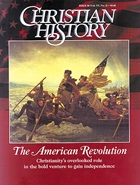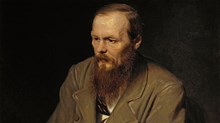Patrick Henry
(1736–1799)
Eloquent thunderer
Inspired by his religious faith and passion for liberty, Patrick Henry not only fought against British tyranny but also the U.S. Constitution!
Born to a plain but respectable family in rural Virginia, Henry started his career at the age of 16 as a struggling storekeeper, and later as a farmer, before becoming a successful, self-taught lawyer in 1760. Educated by his father, Henry’s modest background won him the title of “man of the people.”
Henry first won fame as a young lawyer in 1763 by attacking the established Anglican clergy as “rapacious harpies” for demanding more money from their parishes. In 1765 he was elected to the Virginia legislature. Ten days after taking his seat, he started the sparks of revolution by calling the king and Parliament “tyrants” for taxing the people without their consent.
During the next ten years, Henry became the leader of the revolutionary movement in Virginia: “a Son of Thunder—Boanerges,” as one contemporary called him (see Mark 3:17). In his most famous speech, Henry drew from the Book of Jeremiah to attack those who still hoped for reconciliation with England. “Gentlemen may cry, ‘Peace, peace,’ ” he shouted, “but there is no peace. The war is actually begun! Give me liberty or give me death!”
After Virginia declared independence, Henry helped set up the new state government, of which he became the first governor. Though he helped to promote the “free exercise of religion” in Virginia’s Declaration of Rights, he did not want complete separation of church and state. Believing that a republic could not survive without “virtue, morality, and religion,” he wanted to see the state support all Christian denominations.
Although an Anglican, his exposure to Presbyterian Calvinism during the Great Awakening fueled his attack on the U.S. Constitution. Concerned that the new government relied too much on the virtue of office holders and not enough on checks and balances, he tried to defeat the proposed constitution in the Virginia Ratifying Convention of 1788. Though he failed, he was a key figure in getting the Bill of Rights added in 1791.
During the last years of his life, he became increasingly alarmed with the spread of deism and atheism coming from France’s “godless revolution.” Henry came out of retirement in 1799 to run for public office in Virginia. As a contemporary put it, he warned against the doctrines of the French philosophers who were at war with “the majesty of Heaven and the welfare of earth, and which were poisoning the minds and morals of the most talented youths of Virginia.” He won the election but died of an intestinal blockage before taking office. In his will, he reminded Americans that “Righteousness alone can exalt them as a nation.” The real “father of our country,” Patrick Henry had 17 children by his two marriages, and 77 grandchildren!
Phillis Wheatley
(1753–1784)
Shocking poet
Though practically unknown today, Phillis Wheatley’s patriotic poetry was widely read in America and Britain during the Revolutionary years, and many scholars consider her the best poet of the times.
Wheatley was born in Africa, captured at age 7, and sold into slavery in Boston. Though no doubt a tragedy to her, later she thanked God for freeing her from her “heathen” home and placing her in the hands of a good Christian family. Within 16 months of arriving in America, Wheatley learned to read English. By age 14, she began writing poetry, and at 17, in 1770, her first poem was published: “An Elegiac Poem, on the Death of the Celebrated Divine … George Whitefield.”
Six years later, while visiting England with her master, her book Poems on Various Subjects, Religious and Moral was published and made her an immediate sensation in Britain and America.
The idea that not only a woman but a black slave could express such beauty astounded the intellectual community. While some like Franklin and Washington praised her abilities, many, like Thomas Jefferson, dismissed her works as being from another’s hand.
It was Phillis’s love of freedom as a slave and a Christian that made her take up her pen for American liberty. She wrote one poem to commemorate George Washington’s appointment as commander in chief of the Continental Army:
Thee, first in place and honors—we demand
The grace and glory of thy martial band.
Fam’d for thy valor, for thy virtues more,
Here every tongue thy guardian aid implore.
Her comparison of American oppression by England to that of black bondage gave fire to the American cause:
Such, such my case. And can I then but pray
Others may never feel the tyrannic sway?
Her poetry was so well-respected, she was held up as an example in anti-slavery tracts to show that blacks were not inferior.
The Wheatleys eventually gave Phillis the freedom she wrote so much about. In 1778 she married John Peters, a black legal advocate, but the marriage was not a happy one. She bore three children, all of whom died young. She and her husband separated, and she died in poverty at age 31.
John Witherspoon
(1723–1794)
“Preacher of sedition”
The Reverend John Witherspoon, champion of both Calvinism and common sense, left his mark on the Presbyterian church, the American Revolution, and the U.S. Constitution. Of the 56 signers of the Declaration of Independence, Witherspoon was the only clergyman.
He was born in Scotland, the son of a Scottish minister, and he received his license to preach from the University of Edinburgh in 1743. He soon was at the center of a deep rift in the Scottish church, a champion of the conservative faction. He preached a strict Calvinism and despised ministers who took a more humanist approach.
In 1768 Witherspoon left Scotland to become president of the College of New Jersey (later Princeton University). He showed a knack for organization, and he reunited the liberal and conservative factions of the American Presbyterian church (divided by the Great Awakening); consequently, the denomination went through a growth spurt.
In intellectual circles, he made Scottish common-sense realism more popular. Against the skepticism of David Hume and the idealism of George Berkeley, this philosophy argued that ordinary people can gain accurate knowledge of the world through responsible use of their senses. This common-sense approach to philosophy had a profound impact on early American history.
Witherspoon’s common-sense views and his concern for the church led him to argue that the colonies ought to sever ties with England. “There is not a single instance in history,” he stated, “in which civil liberty was lost and religious liberty preserved.” Starting in May 1776, he began arguing for independence from the pulpit, earning him the Tory title, “Doctor Silverspoon, Preacher of Sedition in America.”
He was appointed to the Second Continental Congress in 1776. As the delegates wavered about declaring independence, he told them, “America is not only ripe for the measure but in danger of rotting for the want of it!”
Between 1776 and 1782, he served on more than a hundred committees. He was not present during the writing of the U.S. Constitution in 1787, but his presence was felt through his Princeton student, James Madison. In Madison’s system of checks and balances, with its separation of powers, one can discern the influence of Witherspoon’s Calvinist lectures on the depravity of humankind.
Witherspoon retired from Congress in 1782 and spent the rest of his years trying to rebuild Princeton, which had been devastated by war and neglect. Upon his death in 1794, it was said, “A great man has fallen in Israel.”
John Jay
(1745–1829)
Reluctant revolutionary
Though considered by some to be one of the nations’s founding fathers, John Jay was at first opposed to American independence.
Socially secure, a member of a wealthy New York Huguenot mercantile family, John Jay entered the law profession in 1768 after receiving his M.A. from King’s College (now Columbia University). His successful practice, however, was cut short by escalating troubles with England.
In 1774 Jay was elected to the First Continental Congress. Conservative in thought, due to his family’s wealth and Tory connections, Jay opposed the use of strong measures against England. A firm believer in rights, however, he authored the Address to the People of Great Britain, in which he charged Parliament with “establishing a system of slavery” by denying Americans the same rights as Englishmen.
During the Second Continental Congress, Jay opposed all talk of independence. Reflecting the interests of the gentry class, he feared that mob rule would shortly follow. Still hoping for reconciliation with England after fighting began, Jay successfully moved that one last conciliatory attempt be sent to the king. He was conveniently absent during the signing of the Declaration of Independence, but once independence was declared, Jay became a warm advocate of the cause. He served as president of Congress in 1778.
At the end of the war, Jay was appointed to write a peace treaty with England. This role he assumed again in 1794 (resulting in the famous “Jay’s Treaty”) and helped prevent another war with England.
Jay always wished for a stronger central government, and he aided the passage of the U.S. Constitution by writing (with James Madison and Alexander Hamilton) essays that came to be known as “The Federalist Papers.” Jay became the first chief justice of the United States and remained in politics until 1801. Throughout his long political career his motto was “Nothing is useful except what is honorable.”
Isaac Backus
(1724–1806)
Baptist freedom fighter
Isaac Backus was born into an elite Puritan family in Connecticut, into a culture that believed the state, for the peace and harmony of society, should enforce Calvinist religion. Backus would spend his life, however, helping to put asunder this marriage of church and state.
His disaffection with Puritanism began when the Great Awakening swept though New England. He had a conversion experience at age 17 and plunged into itinerant preaching. He soon left the Standing (Puritan) Church and joined the Separate Baptists who, in contrast, were against open communion. In 1747 he was formally ordained at the Separate Church in Middleborough, Massachusetts, where he had been pastoring.
Slowly, after agonizing prayer and Bible study, he came to even more pronounced Baptist beliefs: he had himself rebaptized, by immersion, no less. This act divided his church, forcing Backus, his family, and some followers to found the First Baptist Church in the same town.
Because his church was not recognized as legitimate, Backus and his followers were forced to pay taxes to the Standing Church. This struck Backus as unjust, and he set out to do something about it. He wrote tracts, drew up petitions, and carried on constant warfare for religious liberty. In 1774 Backus was sent to the First Continental Congress as a lobbyist for the Baptist Warren Association; Baptists wanted to insure that while delegates talked about freedom they not neglect religious liberty.
Upon receiving news of bloodshed at Lexington, Backus found himself in a bind. He was opposed to his colony’s interference in religion, and he had been ready to appeal to King George III for help. At the same time, Backus believed that if America lost the war, Anglicanism would be firmly established in New England, allowing for even less religious freedom. So Backus took to his pulpit to justify both independence and war.
In 1780 Backus tried unsuccessfully to lobby for separation of church and state in Massachusetts. But eight years later, as a delegate to the Massachusetts Ratifying Convention, he achieved a partial victory when he helped secure the passage of the U.S. Constitution.
Unlike most of his fellow Baptists, who didn’t believe the Constitution guaranteed religious freedom, Backus believed that “the exclusion of any hereditary, lordly power, and of any religious tests” for holding office promoted separation of church and state and would eventually push New England to disestablish its churches. He was right; 27 years after his death, in 1833, the last state church (in Massachusetts) was finally disestablished.
Mark Couvillon is historical interpreter and researcher at the Colonial Williamsburg Foundation. He is co-author of "Patrick Henry Essays" (1994).
Copyright © 1996 by the author or Christianity Today/Christian History magazine.
Click here for reprint information on Christian History.

Support Our Work
Subscribe to CT for less than $4.25/month






























